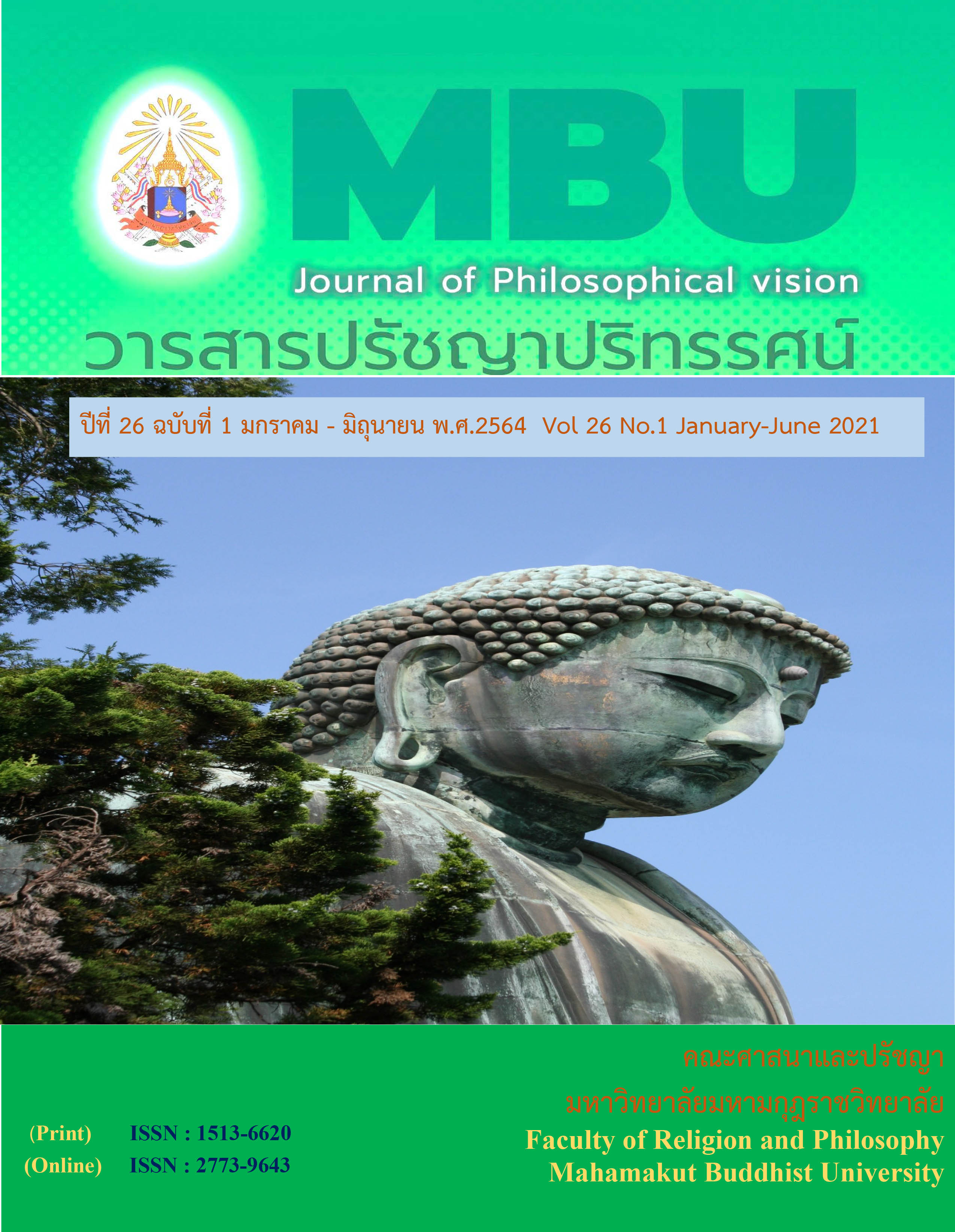Consciousness in Yogacara Buddhism
คำสำคัญ:
Consciousness;, Yogacara;, Buddhismบทคัดย่อ
This study explores profound concepts in Buddhist philosophy and practice, encompassing Dependent Origination, Interconnectedness in Yogacara Buddhism, Yogacara Buddhism and Compassion in the Context of Emptiness, The Nature of Consciousness and Emptiness (Shunyata), and the interplay of Interconnected Compassion and Emptiness. Dependent Origination, a central concept in Buddhism, unveils the web of causality underlying suffering and guides ethical and spiritual practice. It emphasizes causality, impermanence, interconnectedness, and the absence of a permanent self, leading to the transcendence of suffering. In Yogacara Buddhism, Interconnectedness takes center stage, revealing the interconnected nature of all existence. This interconnectedness inspires mindfulness, compassion, ethical behavior, and interfaith dialogue, fostering a more compassionate and harmonious society. Yogacara Buddhism and Compassion, integrated with the concept of Emptiness, challenge the inherent existence of the self. This leads to self-compassion, mental well-being, and an expanded compassion that transcends ego-centered concerns. Emptiness itself guides meditation practice, fostering self-acceptance and a profound understanding of the interconnected nature of consciousness. The Nature of Consciousness and Emptiness (Shunyata) examines the illusory nature of the self and emphasizes interconnectedness. Emptiness challenges the enduring self, promoting self-compassion and enhancing mental well-being. The interplay of Interconnected Compassion and Emptiness reveals the transformative synergy between interconnectedness and emptiness. This interplay deepens understanding of the self and others, fostering self-compassion, compassion for all beings, and an ethical sense of responsibility. These concepts, when combined, offer a holistic framework for individuals to transcend suffering, nurture compassion, and awaken to the interconnected and ever-changing nature of reality. This study showcases the profound insights and practical applications of these Buddhist philosophies, shedding light on their potential for personal and societal transformation.
Downloads
เอกสารอ้างอิง
Beane, W. C. (1974). Buddhist causality and compassion. Religious Studies, 10(4), 441-456.
Denis, D. (2021). Fundamental Intelligence, a Buddhist Justification for the Universal Principles Underlying IHL. Contemporary Buddhism, 22(1-2), 164-189.
Gokhale, S. E. (2013). Empty Selves: A Comparative Analysis of Mahayana Buddhism, Jean-Paul Sartre's Existentialism, and Depth Psychology.
King, S. B. (1991). Buddha nature. SUNY press.
Kwee, M. G. (2011, May). Relational Buddhism: Toward the social construction of societal harmony in-between-selves. In Proceedings of the 8th International Buddhist Conference on the United Nations Day of Vesak Celebrations, Buddhist virtues in.
Lefebure, L. D. (1996). Mimesis, Violence, and Socially Engaged Buddhism: Overture to a Dialogue. Contagion: Journal of Violence, Mimesis, and Culture, 3(1), 121-140.
Maurits Kwee, G. T. (2015). Pristine mindfulness: Heartfulness and beyond. Buddhist foundations of mindfulness, 339-362.
Schmithausen, Lambert. (2014). The Genesis of Yogācāra-Vijñānavāda: Responses and Reflections, Tokyo, The International Institute for Buddhist Studies.
Schmithausen, Lambert. (2014). The Genesis of Yogācāra-Vijñānavāda: Responses and Reflections, Tokyo, The International Institute for Buddhist Studies.
Siderits, Mark. (2017). Buddhism as philosophy.
Stenzel, J. C. (2020). The Sciencization of Compassion. Journal of Dharma Studies, 3(2), 245-271.
Thepa, P. C. A. (2019). Niravana: the world is not born of cause. International Journal of Research, 6(2), 600-606.
Thurman, R. A. (2011). Freeing the body, freeing the mind: Writings on the connections between yoga and Buddhism. Shambhala Publications.
Unno, T. (2000). Constructive Buddhist theology: A response. Buddhist theology: Critical reflections by contemporary Buddhist scholars, 386-405.
Van Gordon, W., Shonin, E., & Griffiths, M. D. (2017). Buddhist emptiness theory: Implications for psychology. Psychology of Religion and Spirituality, 9(4), 309.
ดาวน์โหลด
เผยแพร่แล้ว
รูปแบบการอ้างอิง
ฉบับ
ประเภทบทความ
สัญญาอนุญาต
ลิขสิทธิ์ (c) 2021 Journal of Philosophical Vision

อนุญาตภายใต้เงื่อนไข Creative Commons Attribution-NonCommercial-NoDerivatives 4.0 International License.
บทความวิชาการและบทความวิจัย ในวารสารฉบับนี้ ถือเป็นความรับผิดชอบของผู้เขียนเท่านั้น
สงวนลิขสิทธิ์ตามพระราชบัญญัติลิขสิทธิ์






